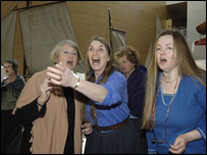 Chorus members warming up.
Chorus members warming up. "It has all the elements for an opera with strong social, political and love interests. The lovers, Mark and Thirza, the wife of the pastor, Pascoe, thwart the villagers' aim, condoned by Pascoe, to relieve their famine by luring a ship to destruction on the coast and stealing its cargo. The villagers realise that someone is warning the ships and accuse Pascoe, whom they find unconscious by a beacon previously lit by Mark and Thirza. They exonerate Pascoe and are condemned to death by the villagers despite Pascoe's pleas.
The Arts Council gave substantial funding to Duchy Opera in the hope of stimulating interest in the opera leading to further performances. Apparently, its premiere in Leipzig in 1906 (sung in German) came to nothing, despite initial success, as Smyth stormed off with the parts in response to the conductor insisting on cuts. Smyth translated it into English in 1910.
Tony Burke was also commissioned to reduce the work for performance by an orchestra of 30 or so from the original large orchestra beloved by Wagner and some of his immediate German successors, of whom Smyth, by training, was one." Read more on our Past Productions page.
 RSS Feed
RSS Feed
